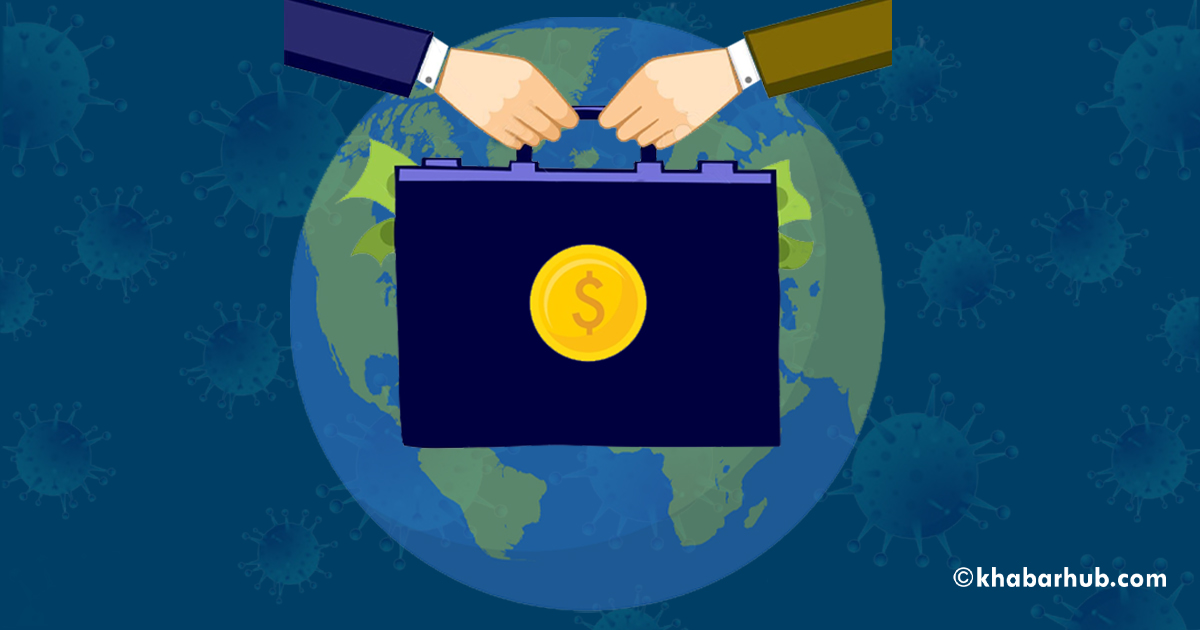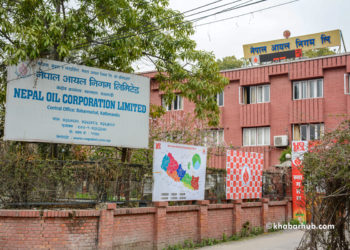Any country prone to epidemics needs development assistance. For a developing country like Nepal, it has greater significance.
Hence, the corruption accompanying such developmental assistance should be strictly controlled. However, the widespread prevalence of COVID-19 has already sewed a condition of corruption in many countries around the world including in Nepal, as some individuals or groups always look to use the ‘power’ to take advantage of such pandemics.
As a result, the country becomes a victim of both the double jeopardy of corruption and pandemic. Therefore, in such a situation, it is extremely important to avoid corruption at any cost.
Whether it is the 7.8-magnitude Nepal’s earthquake of 2015, the flood and landslides that we face every year in the Terai region, or the ongoing COVID-19 pandemic, in all these situations; both internal and external relief funds and grants have always been misused or corrupted.
The problem of corruption can be solved only when the government is accountable for their action. Especially the rapidly spreading of the COVID-19 pandemic has created an alarming situation for the entire world.
This has caused the country with great financial loss and has raised a moral question over our leadership. After being exposed to the fact that there was about ten times more price because of corruption in importing low-quality COVID-19 test kits, protests from people and the media forced the government to cancel the deal.
The problem of corruption can be solved only when the government is accountable for their action. Especially the rapidly spreading of the COVID-19 pandemic has created an alarming situation for the entire world.
In countries with weak health systems like ours, it pulls people at greater risk of corruption during epidemics. There are always relief funds created by different groups of people at such epidemics.
Only through the anti-corruption act and the accountability policy can ensure their proper utilization. Development assistance for COVID-19 becomes effective when it is spent on the right thing.
Only when we stop the tendency of corruption, it helps to reduce the damage caused by the pandemic. Looking around the world, only in March, we can easily observe that the corruption case has increased steadily.
Transparency and accountability have diminished. Pandemics and epidemics have become the latest political propaganda across the globe.
After China and Italy; Spain, France, the UK, Germany and the USA have experienced a huge storm of COVID-19.
Similarly, during an epidemic in Uganda in Africa, there were reports of burglarizing and spreading the disease to Quarantine by bribing citizens.
IC’s report forced Italy to cancel the public bidding to an agricultural company that got a contract to make masks. In Hungary, the Prime Minister extended the indefinite period of emergency emphasizing the right to make critical decisions without involving the parliament.
The Serbian president publicly said that he was forced to take the semi-ash market because of the lack of ventilators in the European market.
In Germany, reports of evidence of corruption in health kits by health workers were reported. Some doctors in Norway wrote prescriptions for their family and friends against the guidelines of the state drug agency.
Our neighboring country India was suspected of failing to test COVID-19 in Tamil Nadu. Likewise, it is reported that the Ministry of Health in Bangladesh failed to test COVID for incoming people due to corruption.
And, we too are facing a similar problem in our country. In the United States, there was criticism against the relief package offered by those in power for personal gain, by changing the rules, laws, suppressing the economy.
The Israeli Prime Minister ordered the use of mobile phone data to secretly track the civilian movement, disable the parliament, and shut down the justice courts. In Iran, the ruling leader is said to have control over the distribution and price of essential goods.
Corruption and irregularities can be controlled by giving special powers or authority to government institutions such as the Commission for the Investigation of Abuse of Authority – CIAA in Nepal during the epidemic.
Similarly, during an epidemic in Uganda in Africa, there were reports of burglarizing and spreading the disease to Quarantine by bribing citizens.
Likewise, the 60 million masks ordered by Germany got missing from Kenya’s airport. These events clearly illustrate how corruption has been seen during the epidemic around the world.
Corruption has reached a peak and transparency and accountability have been diminished. During the pandemic, there is a significant black market, especially in the case of emergency purchases, gray and black merchants, and low-quality goods.
As we are currently facing in Nepal, there was widespread corruption in international assistance received during the Ebola outbreak in Africa, which took place in 2013-16.
Therefore, the procurement of health equipment during the epidemic raises the high risk of corruption, so we need to be vigilant and watch the government’s activities more carefully than ever.
Similarly, in a developing country like ours, where there is a lack of competent leadership and transparency, it makes it more difficult to implement complex treatment protocols for epidemics and pandemics like COVID-19.
Therefore, people are recruited in the guise of inept politics and pressure from traders, which is fatal to any country suffering from epidemics.
Corruption can also occur while providing healthcare services to the public. It can be performed through informal payments, over-prescription, bias, tuition, etc.
If only these can be controlled, the service seeker gets the better facilities as per their needs. This also can control the spread of epidemics and corruption happening in epidemics.
On the eve of such an epidemic, we can invest in research by creating a national fund from the government level. Mahabir Pun has already initiated an idea of a National Research Center.
The government should always encourage such initiatives by providing possible support which lasts long forever and become a strong asset for our country.
The defense of the public interest should be prioritized by discouraging those seeking profit through corruption during the global crisis.
No developmental assistance or relief funds are provided to get wasted in corruption. But, such grants and assistance should be used to increase the effectiveness of preventing further damage.
To prevent the epidemic corruption, it is necessary to strengthen the traditional anti-corruption policies and programs in our society.
The focus should be on financial management to identify and prevent corruption. Providing proper salaries, facilities, allowances, etc. to the employees involved in the public health sector could directly help to reduce the potential corruption during the epidemic in the health sector.
Likewise, besides the government, private and non-governmental organizations have started raising funds in the name of various COVID-19 relief programs.
Nowadays, online sites like ‘Go Fund Me’ are widely used to raise funds but they should be strictly controlled as they can increase the morale of corruption in the epidemic.
If the government directs everyone to deposit only in the relief fund established by the government and mobilize both private and non-government organizations to conduct various relief programs, it will be helpful to reduce corruption.
Corruption and irregularities can be controlled by giving special powers or authority to government institutions such as the Commission for the Investigation of Abuse of Authority – CIAA in Nepal during the epidemic.
It can maintain accountability in an emergency with the investigation and prosecuting those who misuse public posts.
The role of civil society is also significant in this case. Whenever an epidemic occurs, it takes a long time for a government like ours to carry out its work strategically.
Therefore, if the government, together with local communities and organizations, advance its programs and practices, it can reduce the catastrophic destruction.
Civil society can play an important role in monitoring the misinformation and news that prevails during the epidemics. Fake News, misinformation and disinformation relating to COVID-19 puts people at the risk of a health crisis, increasing fears in society.
It is also against human rights and democracy. Hence, they should be identified and strictly controlled. Therefore, during such catastrophes, human rights considerations should be prioritized. Human rights theories such as the influence of non-discrimination, transparency, and respect for human dignity hold special recognition at this period.
At such crucial periods, the government thoughtfully has to take steps for the benefit of the nation and people according to the demand and the nature of the need.
Some countries have strict restrictions on freedom of movement in epidemics, while others have taken a comfortable approach.
During this phase, the government must make decisions in favor of the nation and its people, balancing the protection of public rights and human rights. In order to reduce the risk of both disease and corruption in the pandemic, it is important for gender combination.
The devastating evidence showed that women have suffered from SARS and Ebola in the world seems to have made a difference according to gender.
We all have a role to play in learning from the past epidemic and surviving the COVID-19 epidemic. This is the high time for corruption, we need to be extra careful and stay away from it.
There are more female health workers in the world. Since they have a major role in domestic activities, they have to bear the additional burden of the epidemic.
Similarly, those who are away from public health resources may find it difficult to access services. Such bells carry the risk of domestic violence and maternal mortality.
Therefore, women and children are at high risk during the pandemic. In the situation like in a pandemic, people become ready to spend any cost to save their and their loved ones to save their lives.
This gives a better opportunity to rise corruption and black activities. If the use of the right code of conduct, pay rise, legal reforms, implementation, and civil society oversight are effective in society, corruption can be reduced in the face of epidemic catastrophe.
For example, conducting online discussions, relying on verified news, fact-checking and engaging participation and response to the government’s steps in the health sector can help in contributing to overcoming corruption.
Finally, we all have a role to play in learning from the past epidemic and surviving the COVID-19 epidemic. This is the high time for corruption, we need to be extra careful and stay away from it.
We have already experienced it at the beginning of the pandemic only, so we must be even more cautious from now on so that we do not fall for the same trap again.
All must unite with the government to ensure transparency in procurement, implement civil society oversight of grant distribution and service flows, and promote integrity rules in the health workforce which helps to strengthen the health sector.
The defense of the public interest should be prioritized by discouraging those seeking profit through corruption during the global crisis.
It will teach us important lessons for other pandemics. Let’s unite and fight against this COVID-19 crisis. Together we can, we will and we should.
(The writer is a Graduate from the Paris School of International Affairs (PSIA), Sciences Po).









Comment